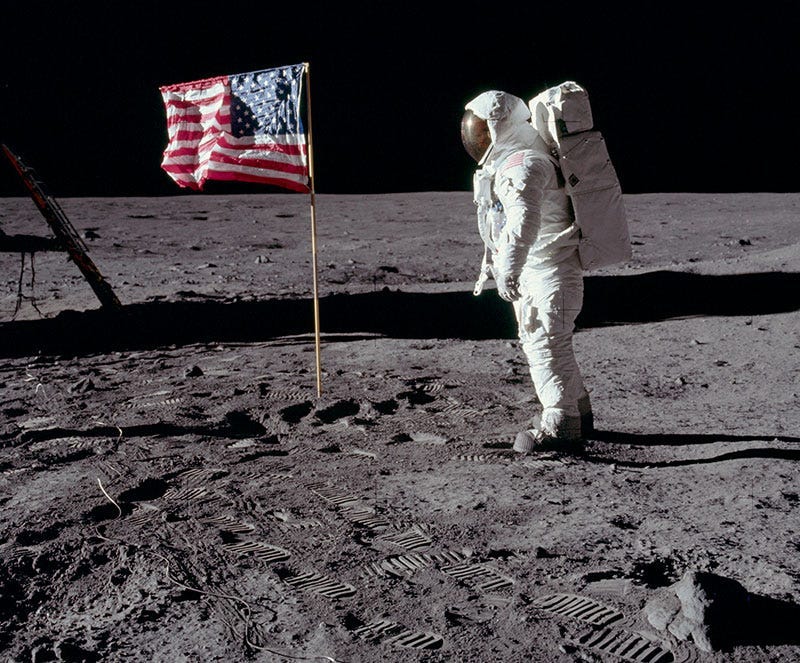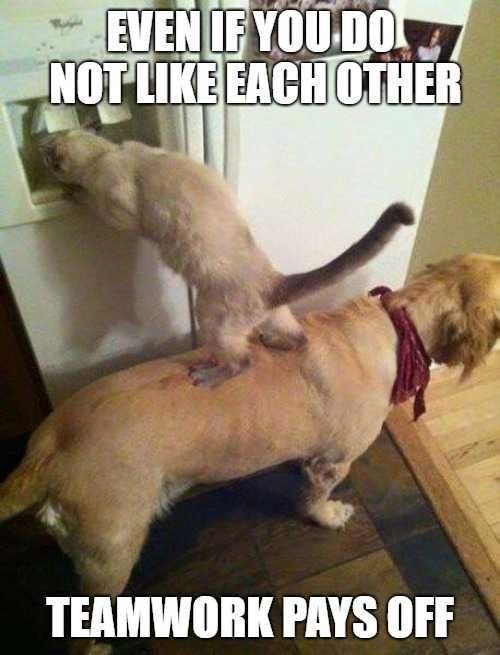How cooperation works
Plus, why bees sting you, why wolves hunt in packs (but bears don't), juiced baseballs, and Charles Darwin cleaning Navy SEAL blood and guts off the wall.
Navy SEAL Mike Monsoor killed himself to save 2 of his buddies.
They were clearing a house in Iraq. Somebody threw a grenade into the house.
Monsoor could’ve ran for it. He had a clear path to safety. But his 2 buddies didn’t.
So instead of running, he threw himself on top of the grenade. He saved his 2 buddies. And he got blown to bits in the process.
Darwin confused
Imagine that the Navy sent a cleanup crew in to clean Monsoor’s blood and guts off the wall. One member of that cleanup crew was Charles Darwin.
“What happened to this guy?” Darwin asks.
“He jumped on a grenade to save his buddies,” they tell him.
Darwin would scratch his head. “Why would he kill himself to save 2 of his friends? According to my theories of natural selection, that makes no sense.”
You would think that people who throw themselves on top of grenades to save their buddies would quickly die out. You would think that guys who run for it and leave their friends to die would survive, and pass on their genes.
That’s true for wolves, and monkeys, and bears, and antelopes, and ostriches, and basically every species on earth — except for Homo sapiens.
Why most animals don’t cooperate
Most species live on their own. They fight for themselves. And they don’t trust anybody else.
(Some animals live in large groups, but those groups are “every man for himself” — fish swim in schools for safety, but that doesn’t mean they take care of each other.)
Elephant mothers usually take care of their babies. So do bears, and cats, and most other mammal species. Most of the time, that’s as far as it goes.
Which is a shame, because cooperation is such a powerful force. When you do get cooperation in nature, the species that cooperates usually kicks ass. Wolves can take down animals much bigger than them because they hunt in packs. Ants can build giant colonies because they all work together.
Imagine if a giant group of bears could hunt together? They could probably do some pretty badass stuff.
The problem is that if a bunch of bears are gonna hunt together, they have to trust each other. And getting 2 animals to trust each other is pretty hard.
The world is basically a series of prisoners’ dilemma games. Most of the time everybody defects. But every now and then, you get conditions under which they can cooperate.

There are 2 ways to get animals to cooperate with one another. The first is for everyone to have exactly the same Darwinian incentives.
For example, all the ants in a colony are basically identical clones of each other. If you’re an ant, every other ant in your colony can pass on your genes just as well as you can, because they’re genetically identical to you. So if you’re an ant, you would gladly sacrifice yourself to save 2 of your brothers.
(This is why it’s evolutionarily advantageous for bees to kill themselves by stinging you: they’re teaching you not to mess with bees, which is worth it to them.)
The other way to get cooperation is to play the prisoners’ dilemma over and over again with the same individuals. When you play the prisoners’ dilemma game once, your incentive is to defect. But when you play the prisoners’ dilemma game many times with the same people, your incentive is to cooperate. That’s because if you defect once, you’ll get punished for it next time.
This is how wolves work together. They play repeated tit for tat games with each other, so it makes sense for them to take care of each other. The problem is, this only works within their packs. A wolf can cooperate with another wolf he knows well. But he can’t cooperate with a wolf he’s never met before.
So why can humans cooperate more than any other animal? 2 reasons.
Why humans do cooperate
Humans have taken repeated tit for tat games to another level. Wolves can only cooperate with wolves they know. But humans can cooperate with complete strangers.
That’s why we can build pyramids, bridges, and rocketships to the moon. And it’s why we can get a hamburger delivered to our house by pushing a few buttons on our phone, instead of having to go out and kill something to get food.
We can cooperate to some pretty extreme lengths, too. Humans like Mike Monsoor will sacrifice themselves to save other humans (even humans who aren’t genetically related to them). Why?
Humans have 2 unique ways of getting each other to cooperate. First, we gossip.
Imagine you’re a wolf, and you steal a piece of meat from another wolf. The other wolf will mistrust you forever. But he can’t tell the other wolves why he hates you. So the other wolves will continue to like you.
Now, imagine you go to your friend’s house, you take a giant ham out of his fridge, you put it in your car, and you drive home. He heads over to your house to borrow your golf clubs, and he sees you eating the ham that just disappeared from his fridge. He’ll probably be pretty pissed at you, and he’ll trust you less. And, he’ll tell all his other friends what you did, and they’ll trust you less, too.
Gossip means that if you behave badly, it won’t just hurt your relationship with the person you screw over. It’ll hurt your relationship with everyone. That incentivizes people not to behave badly.
Also, humans have neural flexibility. We adapted to be able to learn all sorts of different things, like how to drive stickshift and fire a gun. We also adapted to be able to believe all sorts of things, like that war is wrong and that you should leave every campsite better than you found it.
In some cases, you can install ideas in people’s heads that hurt their genetic fitness — like that they should be willing to die for their country, military unit, God, political belief, or whatever other cause. That’s a natural consequence of being receptive to ideas. It also means we go to crazier lengths to cooperate with each other than other species.
All that, combined with our intelligence, opposable thumbs, and ability to use language, lets us do crazy stuff that no species has ever done before, like go to the moon.

Cooperation vs. defection
Just because people sometimes cooperate doesn’t mean we always cooperate. Plenty of people kill, rape, and steal from each other.
People are more likely to defect when they’re not likely to get caught. If you’re a bureaucrat and you have to process learner’s permit applicants, for example, you can reject somebody’s application without even reading it, just because you’re tired. Nobody will ever know the difference.
People are also more likely to defect around strangers, who won’t be able to gossip about them. This is one reason why big cities have higher crime rates than small towns: if you do something bad in a small town, people gossip, and your reputation will be ruined forever. But if you do something bad in a big city, the people you know will probably never find out.
People are more likely to cooperate when they’re trying to do something difficult together. Startups and elite military units cooperate because when they defect, the consequences are pretty nasty: they go broke, or they get killed. But when success is assured, people cooperate less and play office politics more, because the survival of the group doesn’t depend on them cooperating.
(In fact, one of the secrets to companies like Tesla and Amazon is that they act like they’re still startups. They act like there’s a sense of urgency with everything that they do, and that the company will go bankrupt if they fuck up.)
People are also more likely to cooperate for a cause that they deeply believe in. Religious missionaries usually work harder to learn languages and embed themselves in other cultures than anthropologists do, because they believe it’s their duty to God.
People are also more likely to cooperate with ingroup members. The human brain divides the world into ingroups and outgroups. And we see ingroup members as more trustworthy than outgroup members. So if you’re from the same hometown as someone, or you went to the same college, or you’re the same race or nationality or religion, you’re more likely to see them as an “ingroup” member and cooperate with them.
Getting people to cooperate
Basically all of human society is set up to reward people for cooperating and punish people for defecting in prisoners’ dilemma games. For example, killing and stealing are basically defections, so we have laws against killing and stealing.
The majority of our moral beliefs are also set up to get people to cooperate instead of defect. From an early age, kids are told stories about people doing heroic and selfless stuff. The point of that is to brainwash young children into cooperating instead of defecting.
Some cultures are better at this than others. Latin American countries are almost all super corrupt; Scandinavian countries are all extremely not corrupt.
One study found that when UN meetings take place, diplomats from less corrupt countries get fewer parking tickets than diplomats from more corrupt countries. (Diplomats have “diplomatic immunity” and don’t have to pay parking tickets; the only reason to park legally as a diplomat is if you feel like you’re supposed to follow the rules.) That means cooperating vs. defecting isn’t just about incentives — it’s also about how you were raised.
Fundamentally there are 3 ways to get somebody to do what you want them to do. You can threaten them, you can get them to believe in what you’re doing, or you can pay them.
Threatening people is fine for shaking them down for protection money, getting them to follow basic laws, et cetera. But if all you do is threaten people, they won’t try that hard. Slaves can do back-breaking labor but not create art. If you draft somebody, he’ll never be an elite soldier. Et cetera.
Paying somebody with money is similar. You can get them to follow your orders. But they’re not really gonna believe in your cause, so most of the time they’ll do the bare minimum.
By far the best way to get people to cooperate with you is to sell them on a religious belief. When people believe in a good religion, they tend to hold themselves to higher ethical standards. (The history YouTuber Whatifalthist often notes that the less religious a society gets, the higher corruption gets, and the higher the tax rate gets.) They also tend to see themselves as part of a greater whole, rather than as distinct individuals.
This is one reason why corporations try to get their employees to believe in their company’s “mission”. If you don’t believe in the mission, they fire you. That’s because you’re gonna work a lot harder if you believe in their mission.
I’m a little bit concerned that our society gets more corrupt by the day. This is because we get less and less Christian and more and more nihilistic by the day. As a result, our morals are slipping. Every day America looks less like a Western European country and more like a Latin American country.
You can see our morals slipping in pretty much everything. Today’s politicians care less about right and wrong and more about power. Journalists care more about slandering their political opponents than telling the truth. Academics come up with bullshit theories, like critical race theory and modern monetary theory, to justify their ideologies and political agendas. People “ghost” each other instead of breaking up with them. Et cetera.

Cooperation in the future
Over the past 10,000 years, larger and larger groups of people have started cooperating with one another.
Once upon a time, people only cooperated with their tiny little roving band of hunter-gatherers. Then people started cooperating with their tribal villages. Then people started cooperating with anyone who believed in the same god as they did. Then people started cooperating with anyone with the same nationality as them.
And today, with a few exceptions, people cooperate with anyone from their general cultural background. Moroccans cooperate with Malaysians, Argentinians cooperate with Mexicans, and Americans cooperate with Ukranians.
The historian-philosopher Yuval Noah Harari says we can’t stop there. Today we have problems that require global cooperation to solve — like climate change and nuclear proliferation. So we need humanity-wide cooperation.
That’s gonna be pretty hard. Every country on Earth has a unique culture and a unique set of special interests. We have different beliefs, different worldviews, and different languages. So how can we expect to work together?
Let’s see if we can figure it out.
Hey! Thanks for reading.
My name’s Theo, and every Monday I publish an article like this one about whatever was on my mind the week before. Usually related to how humans and society work, or long-term trends I see playing out in the world.
If you liked this article, there’s plenty more where it came from. Feel free to follow my Substack here:
Happy trails!









All your essays are very thoughtful and thought-provoking, but I believe this is your best essay yet. It's a very profound insight that is simply and thoroughly explained. Like any other powerful tool, gossip can be used for both good and evil. That is why the 9th commandment insists, "You shall not bear FALSE witness".
One of the main reasons for the success of the United States has always been that one becomes an American by swearing to support and defend the Constitution, rather than a sovereign or even the Motherland or Fatherland. Of course, prejudice doesn't naturally disappear, but it's widely acknowledged and practiced that my Indian-born Sikh friend, or my Chinese-born co-worker is just as much an American citizen as i am. (Yes, many people fall short, but it's remarkable that those are the exceptions rather than the rule.) No one has to renounce their heritage, just their allegiance to "any foreign prince, potentate, state, or sovereignty". No one outside a few scattered nutjobs believe that Irish Americans can't celebrate St. Patrick's Day or Mexican Americans can't celebrate Cinco de Mayo and still be the most loyal American citizens. In fact, it's traditional for Americans who don't directly share such cultural heritage to celebrate with them.
Clearly, attempts to tribalize Americans based on their ethnicity by shunning and shaming others for appreciating it, especially coupled with the insistence that we not be bound by that "obsolete document written by old white men" are profoundly anti-progress and even anti-human.
On the subject of religion, that doesn't really explain why Europe is less religious than Latin America, yet has much higher levels of social trust.